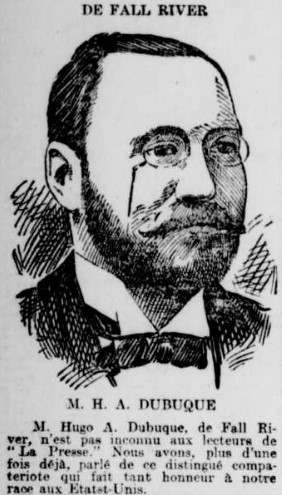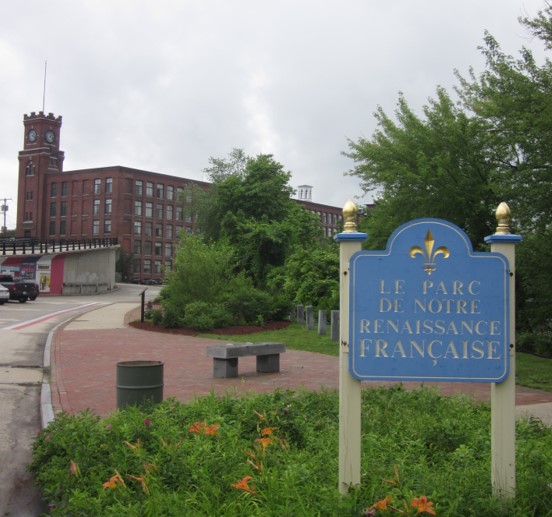We could write a lengthy treatise on the French-Canadian “national” convention held in Nashua, New Hampshire, in June 1888. Some unusual moments and distinguished visitors set it apart. Still, it remains significant partly because it did not mark a major departure from prior congresses; its speeches and resolutions offer a microcosm of late nineteenth-century Franco-American elite discourse. Without further ado, let’s see what Hugo Dubuque, the distinguished attorney from Fall River, had to say on that occasion—and what his words might tell us about that elite discourse.
The excerpt is extracted from the Boston Daily Globe, which was consistently friendly to the Franco-American element—by the standards of the mainstream American press—through this period.
Mr. Dubuque Said:
Procul fato juxta corde. Though divided by fate we are one in heart. It is a great honor for me to welcome you on this memorable occasion and to echo your sentiments and renew your hopes for the future. The French race still lives in this free America. We look upon its past history with the tenderest emotions and we have resolved to perpetuate its language in our churches and families. But we would be unworthy of our sires and recreant to every duty if we did not pledge our loyalty to our adopted country.
Our people founded a great many cities, such as Detroit, St. Paul, Chicago, St. Louis, etc. And the one who has the honor of addressing you on this occasion is a descendant of the founder of the first capital city of Iowa, which still bears his name.

Some people may wonder why the French in Canada did not openly espouse the cause of the American revolution. History supplies us with an answer. In 1774, 11 years after France had ceased to own Canada, the English Parliament passed an act recognizing the terms of the treaty of Paris of 1763 by granting the freedom of worship to the French inhabitants of Canada, and it thought to restore the French laws in all matters except in criminal cases . . . The American colonists were very indignant . . . This was expressed in the burning language so consonant with the spirit of the times, and it created considerable anxiety among the French in Canada. The impression thus created could not be dispelled by the subsequent declarations of Congress or its agents. Notwithstanding this unfortunate occurrence, a certain number of French Canadians were found in the Continental army, and among them the original settlers on the Western lands.
But it was, nevertheless, men of our race who decided the conflict in favor of the colonies. When the soldier of France shed his blood in defence of the republic he earned for the members of his race not only an everlasting debt of gratitude, but he prepared for them a sacred heritage which we are happy to receive now in common with the compatriots of Washington, Montgomery and the other people who help[ed] by their presence and their intelligence to make of this great country a land of the free and home of the brave.
Every one among us is free to join any political party, according to the dictates of their conscience. In fact, some of our people are to be found in each of the great political parties. Those are the sentiments often expressed in our conventions and elsewhere. We do not want to impose our language on others. Some people are greatly mistaken about the quality of French that we speak. They assert, without knowing, that we speak only a patois, a sort of mongrel dialect made up of bad French and Indian. Even if we treat the Indian kindly, yet it does not follow that we adopted their language.
If we are told that we are an obstacle to the assimilation of races in this country we may reply that so far as politics and business, arts and science are concerned, we are willing to assimilate, but as regards other matters we think that variety and unity are not always incompatible.

We should insist most earnestly upon education and naturalization. I put education first, because ignorance, which is another name for darkness, is a crime, when we are overflooded with the light of knowledge on every hand. The want of education deprives man of his powers and of his freedom. Ignorance is the mother of suspicion, and prejudice; it is the fruitful source of unhappiness and poverty; it weakens nature and degrades manhood. On the other hand, education is an invaluable riches [sic]; it increases our forces and enjoyments manifold; it frees us from prejudice and the slavery of dependence upon others.
Every French Canadian should be naturalized. It would be an insult to our intelligence and a blow to our self pride if we were to be looked upon as outcasts in society. We contribute directly and indirectly to the public funds, we are interested in the honest administration of the laws and the protection of life and property. Why should we not bear the burden when we receive the advantages of popular government? We enjoy the franchise in Canada; let us do the same here.
Dubuque put his money where his mouth was—not merely by becoming a citizen and promoting naturalization, but by running for office as well. Four months after the convention, as a Republican, he was elected to represent Fall River in the Massachusetts General Court. He would return to the legislature in the 1890s and eventually secure an appointment to the state’s Superior Court. (For more on some of his political contemporaries, see these posts on Edmond Mallet and Benjamin Lenthier.)
Elite discourse changed little over the course of the next generation. Franco opinion became increasingly fractured after the First World War as communities across the Northeast had very different experiences of economic change and cultural pressures. For one such perspective, consider reading F.-X. Belleau’s famous letter from the 1920s. Belleau was a Democratic politician and a long-time member of the Maine state legislature.
Next week: Three moments in Franco-American women’s political participation. In the meantime, readers interested in learning more about Franco-Americans in politics may want to watch this short video posted by the French-Canadian Legacy Podcast and read this thread on the colorful mayor of Ogdensburg, Ralph J. Morissette. Comments are always welcome.
Leave a Reply